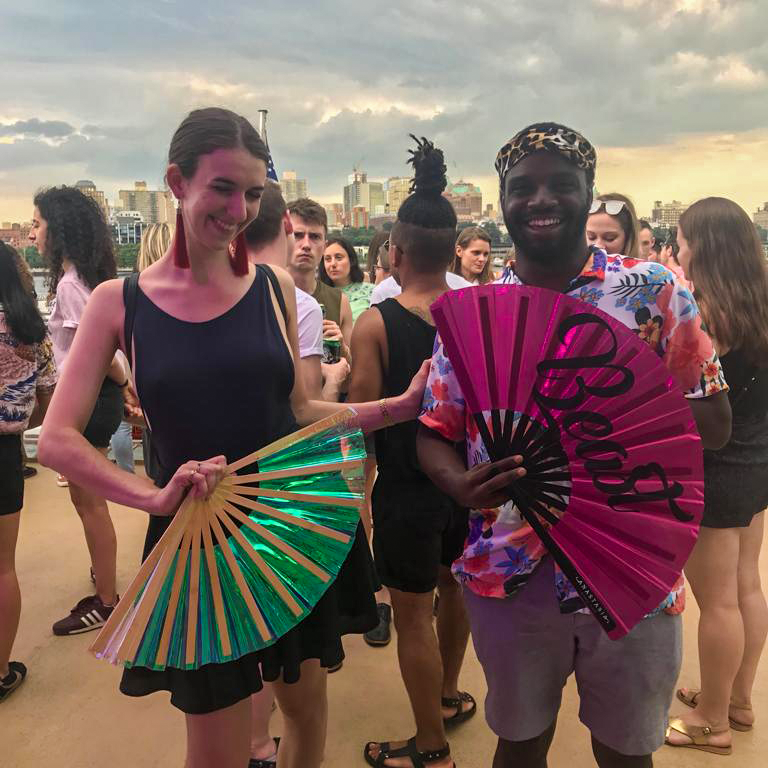(Image caption: The author celebrating two years sober at a queer dance party.)
Alcohol and drug use are often seen at the forefront of LGBTQ+ life — whether it’s raucous Pride parties or shows like Euphoria portraying queer people as drinking and using.
Drugs and alcohol are in some ways deeply entwined in queer life. For decades, gay bars have been a place where queer people can gather in relative safety to relax and build community, and the famous Stonewall Riots took place at a queer bar in New York City. Drugs like amyl nitrate (poppers) and methamphetamine are also not uncommon in the queer hookup scene.
Beyond media portrayal, the numbers tell a similar story. Research tells us that lesbian, gay and bisexual (LGB) young adults tend to use substances at twice the rate of their heterosexual peers, and nearly one in three LGB adults has a substance use disorder, compared to less than one in six in the general U.S. population.
In addition, those LGBTQ+ individuals who use substances are more likely to have accompanying mental and physical health needs. LGBTQ+ youth who use substances regularly, for example, have nearly three times the odds of attempting suicide compared to those who do not use regularly.
Many in the LGBTQ+ community face daily discrimination or threats of violence, homelessness and more, with drugs and alcohol serving as a coping strategy. Others choose to drink or use drugs because they want to have a good time, not for a deeper reason.
I didn’t get sober to protest the amount of drugs and alcohol in the LGBTQ+ community, or as an excuse to get out of dancing and partying. I got sober because drinking was starting to hurt me and those I cared about, and if I kept it up, I wasn’t going to like myself for much longer.
Getting sober was the right decision for me, but it also made finding a queer community more difficult. It seemed every event for LGBTQ+ individuals to socialize was centered around substance use.
For those looking to make new friends, navigating the process in a substance-free way can be daunting.
I ultimately found supportive LGBTQ+ groups and spaces that don’t focus on drugs or alcohol, and I am grateful to have arrived at a point where I’m comfortable being around substance use. But sober or not, LGBTQ+ individuals need and deserve places to congregate without drugs or alcohol involved.
For those of us who work in behavioral health, education or similar fields, this is an opportunity to create supportive, empowering spaces for LGBTQ+ individuals of all ages. Creating a substance-free space can be enjoyable and creative; a chance to show LGBTQ+ individuals that you welcome them regardless of their substance use. It could mean:
- Facilitating events where an activity is the focus, like roller skating, rather than mingling.
- Serving only alcohol-free options at events instead of alcoholic beverages.
- Encouraging staff who feel comfortable to share why they chose to moderate or stop using.
- Scheduling events at times that might otherwise be popular for drinking or using substances, like late at night or very early in the morning.
- Sharing resources for those who may want to reduce or stop drinking/using substances; some options include SMART Recovery, Gay and Sober and SAMHSA’s treatment locator.
It’s important to note that substance-free spaces should not be stigmatizing to those who do use drugs or alcohol. There are many reasons individuals may be using, and it has been shown that stigma is one of the main reasons people choose not to seek treatment for substance use.
I am grateful I have friends and loved ones who support my sobriety, as well as community spaces where I feel comfortable being sober. I hope my experiences will help others create and find similar spaces for the queer people in their lives and communities.
If you are unsure how to help someone who currently uses drugs or alcohol, or would like to moderate or stop using, you can consult this guide on tips for supporting them and yourself. For LGBTQ+ resources from the National Council, visit our Pride Month webpage.
Guest Author
Director, Practice Improvement and Consulting
National Council for Mental Wellbeing




